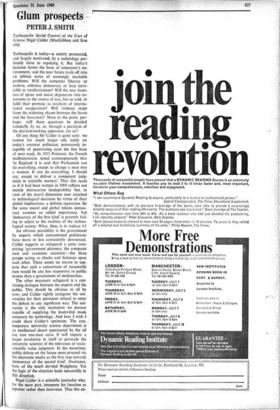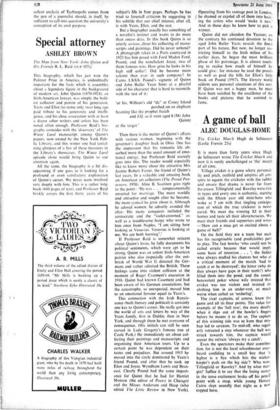Glum prospects
PETER J. SMITH
Technopolis is today—a society permeated, and largely motivated, by a technology per- ilously close to capsizing it. But today's decision forms the basis of tomorrow's en- vironment; and the near future trails off into an infinite series of seemingly insoluble problems. Will the computer liberate or enslave, enhance democracy or lead inevi- tably to totalitarianism? Will the new front- iers of space and ocean degenerate into ex- tensions to the arenas of war, hot or cold, or fulfil their promise as catalysts of interna- tional cooperation? Will violence erupt from the widening chasm between the haves and the have-nots? More to the point, per- haps: will these questions be decided rationally by us, or, through a paralysis of the decision-making apparatus, for us?
Of one thing Mr Calder is quite sure: we cannot for much longer rely solely on today's amateur politician, notoriously in- capable of penetrating even the fine haze of next week. In 1913 Poincare, the French mathematician, noted contemptuously that `in England it is said that Parliament can do everything, except to change a man into a woman. It can do everything, I should say, except to deliver a competent judg- ment in scientific matters'. That this reads as if it had been written in 1969 reflects not merely dinosaurian inadaptability but, in view of the moral dimension now attached to technological decisions by virtue of their global implications, a definite regression. By the same moral and global tokens democ- racy assumes an added importance. Yet `democracy of the first kind' is patently fail- ing to adjust to the realities of the techno- logical society. What, then, is to replace it?
An obvious possibility is the government by experts which conventional politicians have more or less consistently denounced. Calder suggests as safeguard a junta com- prising `government planners, the computer men and academic scientists'—the three groups acting as checks and balances upon each other. There seems no reason to sup- pose that such a consortium of reasonable men would be any less responsive to public desires than a government of mediocrities.
The other necessary safeguard is a con- tinuing dialogue between the experts and the public. This should be obvious to all by now; and Calder rightly castigates the uni- versities for their persistent refusal to enter the debate in any significant way. The uni- versity is the only institution we possess capable of supplying the leadership made necessary by technology. And here I wish I could share Calder's optimism. The con- temporary university science department is an intellectual desert punctuated by the all too rare one-man oasis. It will require a major revolution in itself to persuade the university scientist of the relevance of socio- scientific value judgment. In the meantime, public debate on the future must proceed via the electronic media as the first step towards `democracy of the second kind'. Overtones, here, of the much derided Wedgbenn. Yet the logic of the situation leads inexorably in this direction.
Nigel Calder is a scientific journalist who. for the most part, interprets his function as reporter rather than innovator. That this ex-
cellent analysis of Technopolis comes from the pen of a journalist should, in itself, be sufficient to call into question the university's conception of its own purpose.







































 Previous page
Previous page